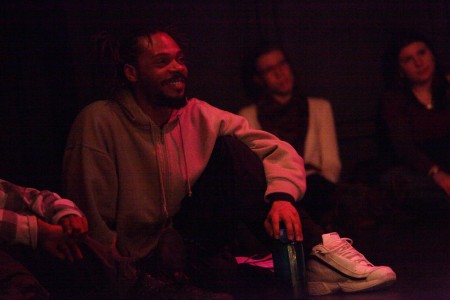Being able to speak anonymously on the internet is an important right, in this age of increasingly constant surveillance. Because of organizations like the NSA, GCHQ, and Canada’s CSE, we can never know when our private conversations are actually being intercepted.
One tiny way to push back is to continue to be bold in asserting the importance of freedom of speech, even what circumstances compel that right to be used anonymously.
To leave anonymous comments on this site, just use whatever made-up name you like, including ‘anonymous’. If you use anon@sindark.com as your email address, you will get an anonymous logo beside your comment.
None of this is intended as an endorsement of the amorphous group ‘Anonymous‘.


Don’t people usually speak more responsibly when they have to identify themselves?
None of this is intended as an endorsement of the amorphous group ‘Anonymous‘.
But you’ve used their symbol.
I just like the symbol. I know little about the group.
If you use anon@anon.com you get a guy in sunglasses.
Luther Blissett is a multiple-use name, an “open reputation” informally adopted and shared by hundreds of artists and social activists all over Europe (most popular in Italy) and South America since 1994.
Unorthodox links to the internet
Signalling dissent
Savvy techies are finding ways to circumvent politically motivated shutdowns of the internet
WITH a tin can, some copper wire and a few dollars’ worth of nuts, bolts and other hardware, a do-it-yourselfer can build a makeshift directional antenna. A mobile phone, souped-up with such an antenna, can talk to a network tower that is dozens of kilometres beyond its normal range (about 5km, or 3 miles). As Gregory Rehm, the author of an online assembly guide for such things, puts it, homemade antennae are “as cool as the other side of the pillow on a hot night”. Of late, however, such antennae have proved much more than simply cool.
According to Jeff Moss, a communications adviser to America’s Department of Homeland Security, their existence has recently been valuable to the operation of several groups of revolutionaries in Egypt, Libya and elsewhere. To get round government shutdowns of internet and mobile-phone networks, resourceful dissidents have used such makeshift antennae to link their computers and handsets to more orthodox transmission equipment in neighbouring countries.
Technologies that transmit data under the noses of repressive authorities in this way are spreading like wildfire among pro-democracy groups, says Mr Moss. For example, after Egypt switched off its internet in January some activists brought laptops to places like Tahrir Square in Cairo to collect, via short-range wireless links, demonstrators’ video recordings and other electronic messages. These activists then broadcast the material to the outside world using range-extending antennae.
AnonyMiss, the yin to the Anonymous yang
“In a letter to Congress, Kazuo Hirai, chairman of Sony’s board of directors, blames hacker group Anonymous for making possible the theft of gamers’ personal information. ‘What is becoming more and more evident is that Sony has been the victim of a very carefully planned, very professional, highly sophisticated criminal cyber attack designed to steal personal and credit card information for illegal purposes,’ Hirai wrote. He also indicated that Sony waited two days before notifying the FBI of the theft.”
Businesses and individuals should take heed from these cautionary tales, says Michael Smith, since case law has already established the Internet is not the haven of free speech that users believe, and there is no such thing as anonymity. Canadian judges are generally willing to order Internet service providers to disclose the identity of people using pseudonyms to criticize others, he says.
Even forwarding an email or posting links on a webpage to another site could be construed as publication under Canadian libel laws, particularly since they have not been updated to take the Internet age into account, Michael Smith warns.
AnonOps Communications
We are fighters for internet freedom.
Being anonymous takes a lot of work these days.
True that
“Websites such as Facebook and Twitter could be forced to unmask so-called internet trolls, under new government proposals in the Defamation Bill. The move comes after a British woman won a landmark case to force Facebook to reveal the identities of internet trolls. On 30 May, Nicola Brookes from Brighton was granted a High Court order after receiving ‘vicious and depraved’ taunts on Facebook. The bill, which is being debated in the House of Commons [Tuesday], will allow victims of online abuse to discover the identity of their persecutors and bring a case against them. The move also aims to protect websites from threats of litigation for inadvertently displaying defamatory comments.”
http://yro.slashdot.org/story/12/06/12/1423232/house-of-commons-could-force-social-networks-to-identify-trolls
Germany: Facebook Must Permit Pseudonyms
Coalition bill would force social media companies to reveal identities of online bullies | Australia news | The Guardian
https://www.theguardian.com/australia-news/2021/nov/28/coalition-bill-would-force-social-media-companies-to-reveal-identities-of-online-bullies
Since at least 2017, a mysterious threat actor has run thousands of malicious servers in entry, middle, and exit positions of the Tor network in what a security researcher has described as an attempt to deanonymize Tor users.
https://it.slashdot.org/story/21/12/06/1941209/a-mysterious-threat-actor-is-running-hundreds-of-malicious-tor-relays